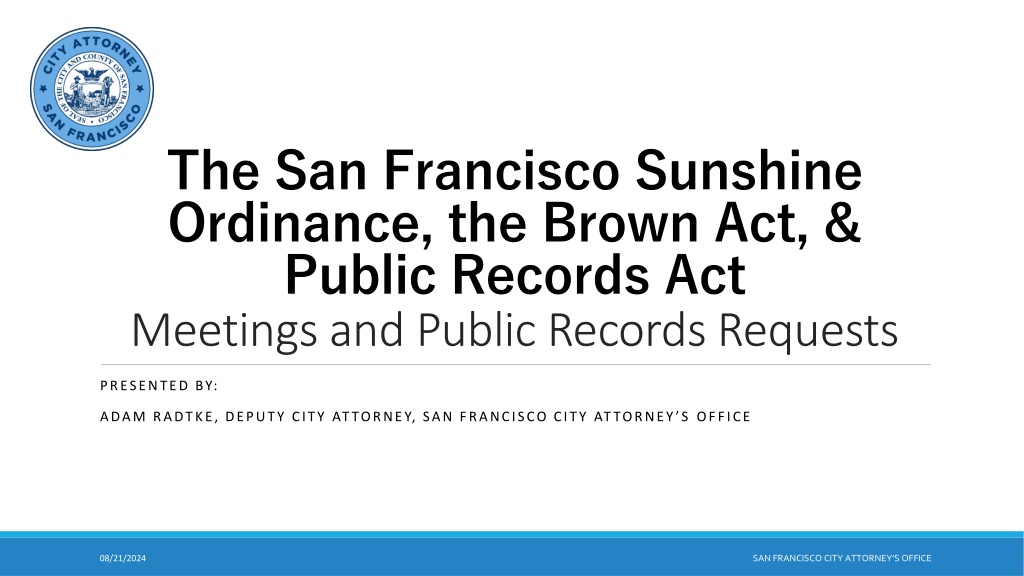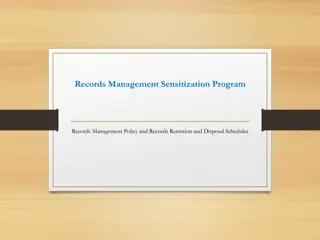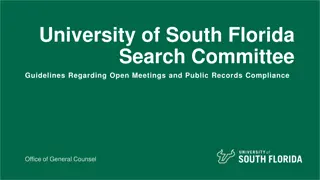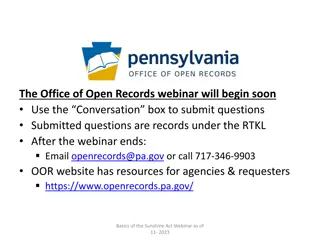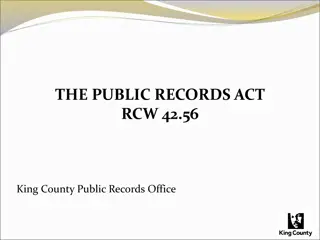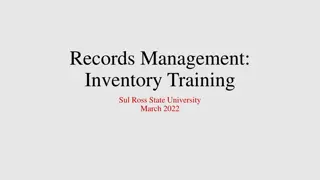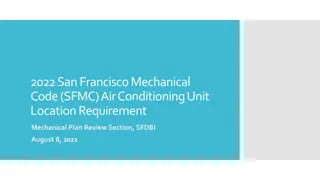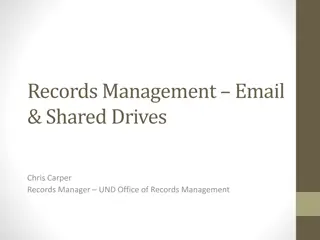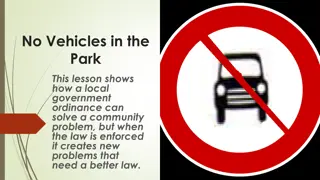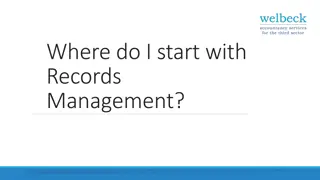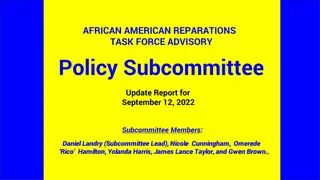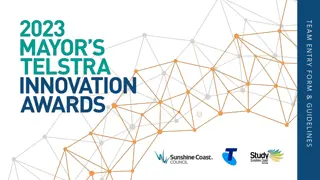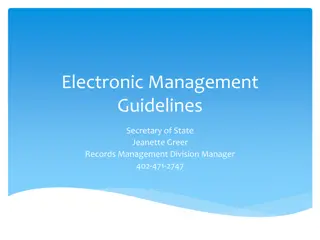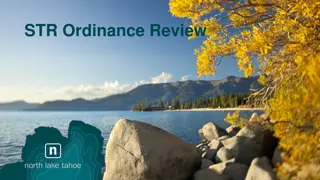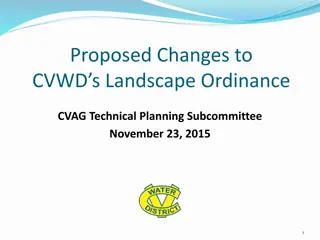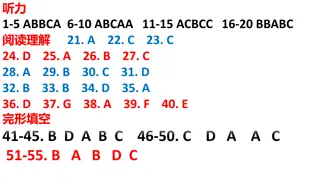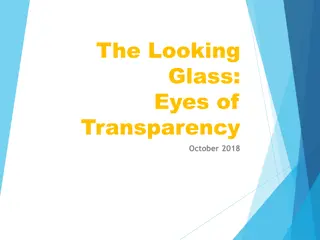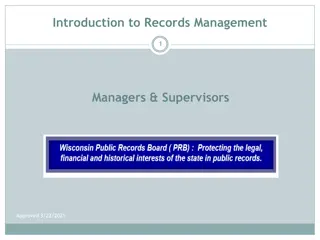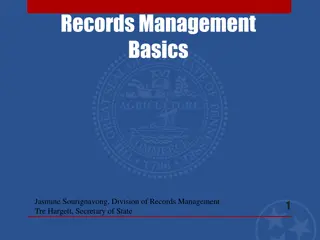Understanding the San Francisco Sunshine Ordinance, Brown Act, and Public Records Act
Explore the essential information on the San Francisco Sunshine Ordinance, Brown Act, and Public Records Act as presented by Adam Radtke, Deputy City Attorney. Learn about the requirements and guidelines for conducting public meetings, public records requests, and ensuring transparency in local legislative bodies like boards and commissions. Understand the definition of meetings, policy bodies, and open meeting basics in compliance with relevant regulations.
Download Presentation

Please find below an Image/Link to download the presentation.
The content on the website is provided AS IS for your information and personal use only. It may not be sold, licensed, or shared on other websites without obtaining consent from the author. Download presentation by click this link. If you encounter any issues during the download, it is possible that the publisher has removed the file from their server.
E N D
Presentation Transcript
The San Francisco Sunshine Ordinance, the Brown Act, & Public Records Act Meetings and Public Records Requests PRESENTED BY: ADAM RADTKE, DEPUTY CITY ATTORNEY, SAN FRANCISCO CITY ATTORNEY S OFFICE 08/21/2024 SAN FRANCISCO CITY ATTORNEY S OFFICE
The Brown Act & Sunshine Ordinance Conducting the People s Business The Brown Act: Government Code 54950-54963 Local legislative bodies, such as boards, councils and commissions, are groups of people who come together to discuss and come up with the most effective ideas. The Ralph M. Brown Act is the law that guarantees the public s right to attend and participate in meetings of local legislative bodies. Sunshine Ordinance: San Francisco Administrative Code Chapter 67 San Francisco s Sunshine Ordinance was developed to ensure easier access to public records and to strengthen open meeting laws. 1 08/21/2024 SAN FRANCISCO CITY ATTORNEY S OFFICE
Meeting Defined A meeting occurs whenever a majority of the members of a policy body come together, or have a serial communication, to discuss any business within the subject matter jurisdiction of this body. Admin. Code 67.3(b)(1). Meetings must be open to the public and held within city limits. Cal. Govt. Code 54954(b); Admin. Code 67.6(b). A meeting occurs even if the policy body takes no action but only gathers information collectively or discusses an issue. Formal meetings, retreats, site tours, and meal gatherings are allowed if done properly. Pre-meetings, post-meetings, teleconferencing (with limited exceptions), and seriatim (or serial) meetings are not permitted. 2 08/21/2024 SAN FRANCISCO CITY ATTORNEY S OFFICE
Policy Bodies The Committee is a policy body, and the Committee meets when a majority of the members of the body (including open seats) come together in the same time and place. This overlaps with a Quorum. In the example of this Committee, 7 out of 12 members constitutes a Quorum. Carefully track attendance because the Committee can lose a Quorum during the meeting, and at that point the Committee cannot take any further formal action other than: (1) fix the time to adjourn, (2) adjourn the meeting, (3) recess the meeting, or (4) take measures to secure a Quorum. Although the meeting of the policy body has ended, members can remain for discussion, but such discussion is not a meeting. Policy bodies often create subgroups or committees comprised of members of the Committee (whether ad hoc or permanent) that are also subject to the Brown Act, such as a standing committees on budget, personnel, bylaws, etc. Subordinate policy bodies may be unintentionally created without a formal vote of the Committee, such as the Chair suggesting that members A & B look into something and report back to the Committee. 3 08/21/2024 SAN FRANCISCO CITY ATTORNEY S OFFICE
Open Meeting Basics Agendas must be posted at the Library and on the department website at least 72 hours in advance for regular and special meetings. Accompanying materials must be posted when made available to the Committee. The public has the right to observe and participate in the meetings, including: General public comment period for all other subjects not listed on the agenda but are within the subject matter jurisdiction of this body (regular meetings only) Separate public comment on every action item before the vote. All deliberations and actions must occur during open, properly noticed meetings. In-person attendance is required and remote attendance is restricted. (See remote exceptions in Legal Rules Governing Remote Participation by Members of Policy Bodies in Meetings Beginning March 1, 2023) The City must provide notice of the cancellation of a meeting to the public as soon as reasonably possible. Admin. Code 67.6(g). 4 08/21/2024 SAN FRANCISCO CITY ATTORNEY S OFFICE
Agenda Requirements Agendas must be posted at least 72 hours before the meeting. Amendments can be posted less than 72 hours in advance as long as they provide greater specificity to what has already been posted. The Agenda should be sufficiently clear and specific to alert a person of average intelligence and education whose interests are affected of the reasons to attend the meeting or seek more information on the item. Reasonable person standard. Agenda must specify discussion, action, and discussion and possible action items. Policy bodies cannot take action unless the item is identified as Action Item. However, the body is not required to take action. Policy bodies cannot discuss or act on items not on the agenda. However, they can direct staff to add items to future agendas, and they can rearrange items on the agenda. Policy bodies can have limited follow-up to general public comment for purposes of clarification, but not discussion. 5 08/21/2024 SAN FRANCISCO CITY ATTORNEY S OFFICE
Dos: Conduct of Meeting Many policy bodies have rules of conduct in their bylaws or resolutions. Start meetings at the scheduled time or later (for example, to wait for a member due to traffic, etc.) Take roll and be sure the quorum is present. Notify the attendees if agenda items that are listed will be discussed in a different order. Admin. Code 67.15(e). Conduct votes openly and publicly. Each individual vote must be recorded by name. If an item has been discussed and the quorum decides to change their stance later in the meeting, that is permitted. When this occurs, the chair must make it clear that the group has not completed its consideration of the item and they intend to bring it up again which includes public comments. The chair may order the removal of individuals engaging in disruptive behavior. Depending on the circumstances, before taking this step, the chair should warn the offending individual and afford an opportunity to correct the behavior. Once an action has been taken, the policy body must disclose the action and announce the vote of each member. Cal. Govt. Code 54953(c)(2). 6 08/21/2024 SAN FRANCISCO CITY ATTORNEY S OFFICE
Donts: Conduct of Meetings No secret or anonymous ballots. No asking members their votes in advance of the meeting. Don t start meetings before the time listed on the agenda. Don t conduct meetings without a quorum. Don t read or send text messages during meetings. An absent member may not vote by proxy. See generally Charter 2.104(b), 4.104(b); Admin. Code 1.29, 67.16. No abstentions all members must vote, unless they have a conflict of interest or are excused by a majority of members present. Charter 4.104(b) 7 08/21/2024 SAN FRANCISCO CITY ATTORNEY S OFFICE
Closed Session Committee Secretary and Chair should consult with City Attorney s Office in advance to ensure compliance with Brown Act/Sunshine Ordinance. Closed-door meetings may be held under limited exceptions. (Real estate negotiations, existing or anticipated litigation, personnel matters, labor negotiations, security matters, etc.) Closed sessions must be properly noticed on the agenda and any action taken must be publicly reported at the end of the session. Individual members of legislative bodies may not disclose information discussed in closed session. During closed session: stay on topic and conduct yourself as though the discussion could later be disclosed, record the session and keep indefinitely, and restrict attendance to members and necessary staff and employees. 8 08/21/2024 SAN FRANCISCO CITY ATTORNEY S OFFICE
Public Attendance and Comment Cannot require sign-in or ID to attend. You may ask for a name, but pseudonyms are allowed. Must allow: Public to record. Provide opportunity to comment before any action is taken. Provide general comment period for non-agenda topics within body s purview. Make writings related to open session business available to public. Members may not respond or act in response to public comment, but may briefly respond or ask questions, refer to staff for follow-up or request that something be placed on a future agenda for discussion. 9 08/21/2024 SAN FRANCISCO CITY ATTORNEY S OFFICE
Checklist for Chair re: Public Comment Ask for public comment on each item, even if the room is empty, so that it is recorded. Take public comment before any vote. Announce the specifics of the vote after each action item. If agenda is rearranged, then let public know ASAP. If item has been scheduled for a specific time, do not take it earlier. Apply and enforce the speaking time equally, regardless of viewpoint, but allow additional time for people with disabilities or who need translation, as appropriate. Public speakers are allowed up to three minutes on an item, but the chair can reduce the speaking time for all public speakers on an item if there is a reasonable basis (Limited time, lots of public speakers, long agenda.) Basis should be on the record and announced before the start of public comment on the item. Public speakers can be critical, but not disruptive. No right to a response. 10 08/21/2024 SAN FRANCISCO CITY ATTORNEY S OFFICE
Sunshine Ordinance & Public Records Act What is a Public Record? It is any writing that contains information relating to the conduct of public business prepared, owned, used by a state or local agency. Examples of Public Records: Agendas, staff reports, contracts, emails, including attachments to emails, video recording, audio recording, voicemail, text messages and photographs. 11 08/21/2024 SAN FRANCISCO CITY ATTORNEY S OFFICE
Information on personal communications devices Any communication relating to the City s business that a public employee or official sends or receives on a personal electronic device such as cell phones and personal computers are subject to disclosure as public records. These communications are subject to the department s retention policy. Consider using City-issued email addresses to conduct Committee business. Consider forwarding any Committee business from your private email address to City-issued email address. Communicate Committee business through the Committee secretary. 12 08/21/2024 SAN FRANCISCO CITY ATTORNEY S OFFICE
You do not have to remember all of this information! This presentation is intended to answer most of the questions we commonly hear from departments, boards and commissions. If you have any questions, feel free to ask us now or contact us in the future as needed. Thank you for your time! 13 08/21/2024 SAN FRANCISCO CITY ATTORNEY S OFFICE
